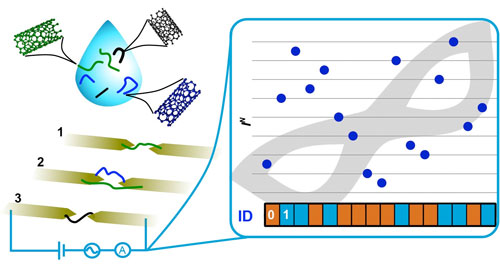|
NOVIDADES
The ubiquity of electronic devices makes it essential to use encryption and anti-counterfeiting tools to protect the privacy and security of users. With the growing expansion of the Internet of Things, protection against attacks that violate the authenticity of products is increasingly necessary. Traditionally, message protection has been based on different systems: passwords, digital signatures or encryption. This cryptography is based on unknown keys to a possible attacker, but unfortunately these systems are becoming obsolete as new more invasive attacks appear: malware, API attacks or physical hardware attacks. While quantum computing slowly progresses towards the cryptographic paradigm, the so-called physically unclonable functions (PUFs) are presented as the choice to ensure unique and effective identification. A PUF is a device that has unique and non-repeatable physical properties that can be translated into usable bits of information. The idea of applying random physical characteristics to identify systems or people is not new: for example, the identification of individuals using the fingerprint dates from the 19th century. More recently, the identity of electronic devices has been established using PUFs, which are "electronic fingerprints" of an integrated circuit. Authentication based on PUFs comprises a chip manufactured by intrinsically random processes that make cloning almost impossible, even though all the details of the manufacturing process are known. The measurements of the various physical properties of the PUF depend on the properties of the chip at the nanoscale, thus constitute a very powerful anti-fraud and anti-counterfeiting technology. To be implementable at an industrial level, this chip must be low cost, scalable and its properties must be easily measurable by means of an identifiable function. Enrique Burzurí, Daniel Granados and Emilio M. Pérez (researchers at IMDEA Nanociencia) have proposed an ingenious and simple PUF based on carbon nanotubes (ACS Applied Nano Materials, "Physically unclonable functions based on single-walled carbon nanotubes: a scalable and inexpensive method toward unique identifiers").  Physically unclonable functions based on single-walled carbon nanotubes. (Image: Enrique Burzurí)
This nanotechnology exploits a characteristic of carbon nanotubes that has usually been detrimental: the difficulty of obtaining carbon nanotubes with identical chirality, that is, with identical electronic properties (conductor or semiconductor). Also, the inherent manufacturing defects such as vacancies or oxygen functionalities mean that two carbon nanotubes with the same chirality do not have the same conductance. These disadvantages have been transformed into the PUF strongest point. These PUFs conceived at IMDEA Nanociencia are easily measurable physical devices that provide a pattern of intrinsic conductance to each of them that is extraordinarily difficult to duplicate. Given the same PUF two different inputs produce different responses, and given the same input two PUFs produce two different responses. In this way, these PUFs based on carbon nanotubes can be identified by the value of the responses they generate to specific inputs. Any PUF defect is not valid here; it must be measurable and provide a unique signature. Currently there are several types of PUFs that are based on physical properties such as reflectivity or magnetic anisotropy. However, the current measurement proposed by Burzurí et al. it is the simplest, cheapest (1 step of lithography) and the most easily implantable in an electronic circuit, besides being potentially scalable to a greater number of electrodes to increase its complexity. These PUFs could be implemented in smartphones, microcontrollers, smart sensors, actuators and could also be used as a digital signature. IMDEA Nanociencia. Posted: May 20, 2019. |
|||||||||||||||||||||||||